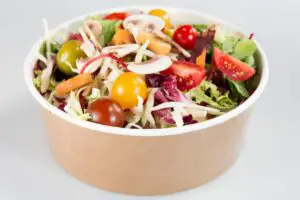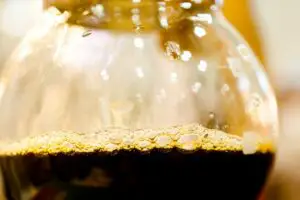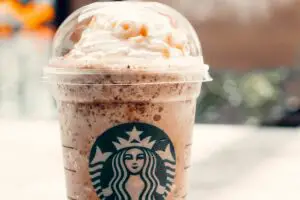*This post may contain affiliate links. As an Amazon Associate we earn from qualifying purchases.
Olive Garden has offered many deals throughout the years. One of their most famous deals is buy one entree and take an entree home for five dollars. This great deal allows you to enjoy a dinner now and dinner later at home.
Additionally, since the breadsticks and soups are endless, you can ask to take some of them home as well. Olive Garden also offers sauces that you can dip your breadsticks into.
WIth all these delicious leftovers coming home with you, can you freeze them to enjoy again for dinner at a much later date?
You can freeze Olive Garden’s meals, breadsticks, soups, and sauces for up to two months.
Some precautions should be taken when freezing these different items however which I will go over next
Freezing Olive Garden’s Meals
You can freeze Olive Garden’s meals. However, when you try to reheat them, the pasta will be dry. You can add your own sauce to try and lock in some of the moisture.
It is best to transfer your Olive Garden leftovers into your own air tight container. Your leftover meal can last anywhere from one to two months in the freezer.
Freezing Olive Garden’s Breadsticks
You will need to remove the breadsticks from Olive Garden’s packaging. The foil lined packaging is designed to keep the breadsticks warm but not airtight.
You can move the breadsticks to an airtight container or a Ziplock baggie. The breadsticks will store in the freezer for close to three months.
Freezing Olive Garden’s Soups
Olive Garden’s soups hold up very well in the freezer. Again, you will want to make sure you remove the soup from its original container and place it in an airtight container.
The soup should last in the freezer for a few months when stored properly.
Freezing Olive Garden’s Sauces
Olive Garden’s sauces can last for close to two months when properly stored in the freezer. Be sure to remove the sauce from its original packaging and store in an airtight container.
Storing your Olive Garden leftovers in the freezer is a great way to preserve your leftovers for up to two months.
How Do You Reheat Olive Garden Breadsticks?
Olive Garden’s breadsticks are a delicious addition to any meal. You can have as many as you want before dinner is even served.
You can have additional breadsticks throughout the meal as well. What about afterward? Can you take Olive Garden breadsticks home as leftovers?
Olive Garden allows customers to take breadsticks home. They have special packaging that is designed to keep your breadsticks warm.
Typically, when you warm up leftover breadsticks in the microwave, they become hard. What about Olive Garden Breadsticks? Is there a way to warm them up without ruining the texture or how it tastes?
The best way to reheat Olive Garden breadsticks is in the oven. You will want to leave the breadsticks in the bag that you got them in when heating them in the oven.
Olive Garden recommends following these instructions for reheating their breadsticks.
- Preheat your oven to 350º Fahrenheit.
- Leave the breadsticks in the bag. If you have already thrown away the bag, you can use foil to wrap around your breadsticks. You can also place the breadsticks on a pan and cover them with foil as well.
- Leave the breadsticks in the oven for about five minutes or until the breadsticks are soft.
If you prefer a faster method of reheating Olive Garden’s breadsticks, you can use the microwave.
Here are some tips to use when reheating your leftover breadsticks.
Olive Garden’s breadstick bags are not microwave safe.
They are lined with foil. The foil in the bag can cause your microwave to catch fire. Remove the breadsticks from their packaging before microwaving.
Wrap a damp paper towel or kitchen towel around your bread.
This will keep in some of the moisture during the reheating process. Wrapping the paper towel around the breadstick will ensure that the bread remains soft.
Reheat in the microwave for close to 30 seconds.
If the breadsticks are still not warm enough after 30 seconds, you can microwave in short bursts until you reach desired warmness.
How Do You Store Leftover Olive Garden Breadsticks?
When you bring a loaf of bread home from the store, it typically goes in the pantry, on the counter, or on top of the fridge. Wherever your bread storage spot is, it most likely is not in the fridge.
Bread is fine to sit on counters for about a week or two and remain fresh. What about Olive Garden’s breadsticks? They are made of bread, so do you leave them on the counter or place them in the fridge?
It is best to store Olive Garden’s breadsticks in the fridge. The breadsticks are covered in butter so putting them in the fridge will help them to taste the best.
Olive Garden’s breadsticks should last in the fridge for close to three days. If you can’t eat them before then then just put them in the freezer.
Are The Breadsticks Free At Olive Garden?
Olive Garden is a well-known Italian restaurant. Ironically, they are not typically well-known for the pasta, they are well-known for their unlimited breadsticks, soups, or salads.
Does this mean that you can just walk in, sit down, and receive free breadsticks?
The breadsticks are free, as ling as you purchase an entree. If you do not prefer to eat a meal, then you can purchase the unlimited soup or salad option and receive unlimited breadsticks as well.
While the breadsticks themselves are typically free, you do need to purchase something else on the menu to receive the “free” breadsticks.
You can also add extra breadsticks to a to go order as well. You can order by the dozen or half dozen. There are also dipping options that you can add as well. Alfredo or marinara dipping sauce are great options to add for making your breadsticks taste even better.
How Long Does Olive Garden’s Soup Last In The Fridge?
In addition to their famous breadsticks, Olive Garden has some excellent soup choices. You can choose from Pasta e Fagioli, Chicken & Gnocchi, Minestrone, and Zuppa Toscana. You can swap out the endless salad and enjoy one of the soups instead.
If you end up with leftover soup, is it possible to take some home as leftovers?
You can ask to take home a bowl of soup for leftovers. Much like the endless breadsticks, you are allowed to take home a bowl of soup to enjoy in the next few days.
Your Olive Garden soup will last in the fridge for two to three days. After that it will begin to go bad.
Final Thoughts
The next time you are enjoying a delicious dinner at Olive Garden, be sure to check out their take-home menu and store your leftovers in the freezer to enjoy another day.









